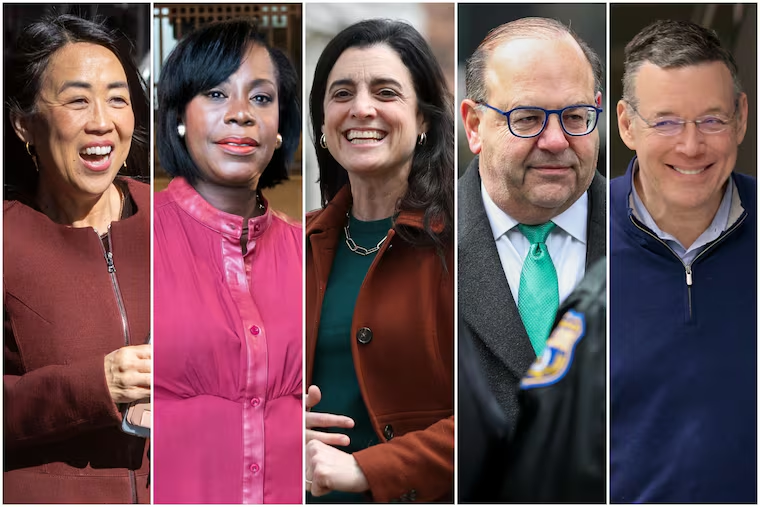The most expensive Philly mayor’s race in history has now topped $31 million
The eye-popping amount of money that has poured into the race is due to three primary factors: lots of candidates, super PACs, and self-funding.

The remarkably competitive Philadelphia mayor’s race continues to attract millions in campaign cash, with the five major Democratic candidates and the groups supporting them raking in $10.5 million more in April, according to the latest campaign finance reports.
Total fundraising for the race is now at about $31.4 million, easily the most expensive election in Philadelphia history. Of that, the candidates’ campaigns have raised a staggering $24.4 million, while outside spending groups have taken in just under $7 million.
The eye-popping amount of money that has poured into the race is due to three primary factors: an unusually high number of viable candidates, an influx of super PAC spending, and self-funding.
With less than two weeks to go before the May 16 primary, five candidates are still considered viable for the Democratic nomination — meaning five campaigns are still squeezing donors’ pocketbooks.
Simultaneously, all but one of the top candidates have benefited from spending by super PACs, which are outside spending groups that can raise money in unlimited amounts. The U.S. Supreme Court opened the floodgates to outside spending through its Citizens United decision in 2010, and this is just the second open Philly mayor’s race in the super PAC era.
The new filings revealed who has been funding the latest super PAC to impact the race: the Coalition for Safety and Equitable Growth, which has aired TV ads attacking former Councilmember Helen Gym. The group raised nearly $1 million, including $750,000 from conservative Main Line billionaire Jeffrey Yass, the filings show.
The final reason for the race’s gargantuan price tag is the most straightforward: Two super-wealthy candidates are dumping millions of dollars of their own money into their campaigns.
Former City Councilmember Allan Domb, a real estate magnate who owns more than 400 properties in Philadelphia, continued to lead the way, putting $3.2 million more into his campaign this reporting cycle for a self-funding total just shy of $10.2 million to date.
First-time candidate and grocery store owner Jeff Brown, whose campaign has weathered a series of controversies, also increased his self-funding game this cycle by contributing $3 million for a total of about $4 million out of his own pocket.
The new campaign finance reports cover money raised and spent between March 28 and May 1, the last regular reporting period before the primary.
Here’s what we know about the money race:
Rhynhart leans into traditional fundraising
Former City Controller Rebecca Rhynhart appears to have shot up to the top of what remains a very close race, according to the limited public polling that has been released.
She has also led in traditional fundraising in recent weeks.
While other candidates have benefited from heavy super PAC spending or self-funding, Rhynhart has relied primarily on her campaign, which raised a field-leading $699,000 from donors and spent $1.25 million in the latest reporting period.
Gym’s campaign raised $379,000 during that period, while spending $1.4 million. Domb raised $293,000 from other donors, but thanks to his self-funding, he was able to spend $3.9 million.
Former Councilmember Cherelle Parker’s campaign took in about $519,000 and spent $640,000. And Brown’s campaign took in $481,000 from other donors while laying out $2.9 million.
Meanwhile, the Philadelphia Leadership PAC, the super PAC backing Rhynhart, raised a relatively modest $239,000 in the same period. It has not yet aired TV ads.
Super PACs play big role
For better or worse, it has become standard practice for mayoral candidates to have super PACs backing them. This year, all of the top contenders except for Domb have one in their corner.
Candidates’ campaigns are subject to the city’s political contribution limits, which this year are $6,200 for individual donors and $25,200 for organizations. Super PACs, however, can collect donations of any size, but are prohibited from coordinating with the candidates they support.
At the moment, the most active is Philadelphians for Our Future, which is backing Parker and is funded largely by money from the building trades unions. The PAC took in more than $1.2 million since late March, and has been spending big on TV.
It recently launched attack ads targeting Rhynhart, Domb, and Brown. That makes Parker the only top candidate who hasn’t been the subject of negative advertising.
The Gym-aligned super PAC, Fighting Together for Philadelphia, took in $520,000 during the same period, largely from teachers unions. The PAC did not run TV ads this week but has reserved almost $400,000 in airtime for the final week of the campaign.
Meanwhile, the PAC backing Brown, For a Better Philadelphia, has gone dormant after being accused by the Philadelphia Board of Ethics of illegally coordinating with Brown. The PAC has denied wrongdoing but agreed to stop spending money to influence the outcome of the race while the ethics board’s case unfolds in court.
Brown throws in $3 million
The ethics investigation and a series of unforced errors have taken Brown from being an early leader in the mayor’s race to resting somewhere near the bottom of the top tier of candidates, according to recent polls.
But it looks as if Brown won’t be going down without a fight.
With the super PAC backing him on the sidelines, the $3 million of his own money that Brown recently funneled into the race is now the lifeblood of his campaign. His campaign spent more than $2.9 million during the last reporting period.
The Fraternal Order of Police Lodge 5 gave his campaign $25,200, the maximum allowed under city election laws. And the International Alliance of Theatrical Stage Employees Local 8, the only building trades union that did not endorse Parker, chipped in $25,000 to Brown’s campaign.